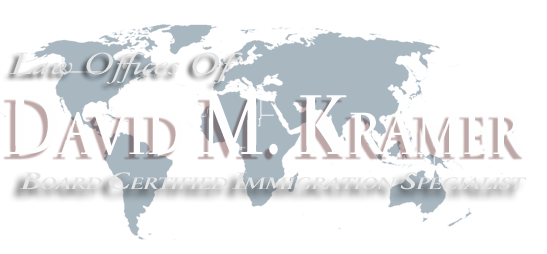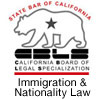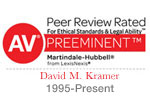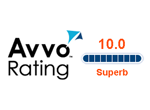Frequently Asked Questions (FAQs)
The information provided below is of a general nature and may not apply to any particular set of facts or circumstances. It should not be construed as legal advice and does not constitute an engagement of the Law Offices of David M. Kramer or establish an attorney-client relationship.
The following are Frequently Asked Questions (FAQs) about both immigration and non-immigration issues. Like the questions, the answers are general and should only be considered a starting point for a more specific and detailed legal analysis of one’s individual circumstances.
- What types of temporary work visas are available?
- What is the criteria for employment-based immigration?
- Is the National Interest Waiver still available under Matter of Dhanasar?
- How much must a foreign national invest in a U.S business to become eligible to apply for permanent residency?
- Is marriage to an American citizen the fast-track to permanent residency?
- Can a U.S. citizen relative apply for permanent residency for me?
- When is it permissible for non-citizens to use public benefits?
1. WHAT TYPES OF TEMPORARY WORK VISAS ARE AVAILABLE?
Specialty Occupations (H-1B)
For individuals who seek temporary entry into the U.S. in a specialty occupation as a professional.
Exchange Visitors (J-1)
For foreign students, scholars, experts, medical interns and residents, and industrial and business trainees to work in the U.S. in government approved exchange visitor programs in order to do research or gain experience in their respective fields.
Treaty Traders (E-1) and Treaty Investors (E-2)
For owners and key employees of businesses which conduct a substantial volume of trade between the U.S. and the home country and for those who invest a substantial amount of capital in the U.S.
Intra-company Transferees (L-1)
For executives, managers or persons with specialized knowledge who transfer to a U.S. branch, business affiliate or subsidiary of a foreign company.
Extraordinary Ability Visas (O-1)
For foreign nationals of extraordinary ability in the sciences, arts, education, business, or athletics to undertake a specific activity or event in the U.S.
2. WHAT IS THE CRITERIA FOR EMPLOYMENT-BASED IMMIGRATION?
Not everyone needs to have an immediate relative who is a U.S. citizen in order to receive preference for a U.S. immigration visa. There are several additional ways to obtain U.S. permanent residency that depend on your employment. If you can answer yes to any of the following you may want to consider applying for permanent residency under one of several employment-based categories:
- Do you have special abilities in the sciences or arts?
- Are you able to contribute significantly to the U.S. national interest?
- Can you invest a substantial amount in a U.S. business?
- Are you able to perform a job which requires two years of training?
- Are you a manager or executive of a U.S. based corporation?
- Are you a professional with at least a bachelor’s degree?
Congress has created five employment-based categories that next to immediate relatives have preference in immigrating to the United States.
The FIRST EMPLOYMENT-BASED PREFERENCE allots 40,000 immigration visas to priority workers who are:
- Aliens of extraordinary ability in the sciences, arts, education business and athletics (no job-offer or labor certification required)
- Outstanding professors or researchers with universities or private employers with established research departments (job-offer needed but no labor certification required)
- Executives and managers of multi-national U.S. businesses (no labor certification
The SECOND EMPLOYMENT-BASED PREFERENCE allots about 40,000 immigration visas to foreign nationals who are:
- Advanced degree professionals or aliens of exceptional ability in the sciences, arts or business whose work is in the national interest (job-offer and labor certification not required)
- Aliens of exceptional ability in the sciences, arts or business (job-offer and labor certification required)
- Advanced degree professionals (job-offer and labor certification required)
The THIRD EMPLOYMENT-BASED PREFERENCE allots about 40,000 immigration visas to:
- Professionals with bachelor’s degrees who do not qualify for the second preference category (job-offer and labor certification required)
- Skilled workers filing positions requiring at least two years of training and experience (job-offer and labor certification required)
- Unskilled workers (job-offer and labor certification required)
The FOURTH EMPLOYMENT-BASED PREFERENCE is for:
- Ministers and religious workers who demonstrate an affiliation with an employer or organization
The FIFTH EMPLOYMENT-BASED PREFERENCE allots 10,000 immigrant visas to investors who:
- Invest a minimum of $500,000 in a new or existing business that creates jobs in specified low-employment areas (no labor certification required)
- Invest a minimum of $1 million in a new or existing business anywhere else in the United States. (no labor certification required)
3. IS THE NATIONAL INTEREST WAIVER STILL AVAILABLE UNDER MATTER OF DHANASAR?
A foreign national who applies under this category must show that he or she will significantly improve the national interest to a substantially greater degree than a U.S. resident. The USCIS continues to raise the standards on determining whether or not a foreign national’s work is in the national interest.
On December 27, 2016, in Matter of Dhanasar, 26 I&N Dec. 884 (AAO 2016), the USCIS Administrative Appeals Office (AAO) announced a new analytical framework for determining whether a foreign national pursuing employment-based permanent residence in the EB-2 category as a member of the professions holding an advanced degree or as an individual of exceptional ability in the sciences, arts, or business is eligible for a discretionary waiver of the job offer and labor certification requirements in the US national interest – a “National Interest Waiver” (NIW).
Under the new test, in order to be granted an NIW, an EB-2 petitioner – either the foreign national or an employer – must meet all of the following criteria, under the preponderance of evidence standard:
- The foreign national’s proposed endeavor has both substantial merit and national importance. A wide range of fields of endeavor may qualify, including business, entrepreneurialism, science, technology, culture, health and education.
- The foreign national is well-positioned to advance the proposed endeavor. To determine whether the foreign national meets this requirement, USCIS will look to his or her education, skills, knowledge and record of success in related or similar efforts, a model or plan for future activities, progress toward achieving the endeavor, and the interest of potential customers, users, investors or other relevant entities or individuals.
- On balance, it would be beneficial to the US to waive the job offer and labor certification requirements of the EB-2 category. To meet this requirement, USCIS will consider (among other factors) whether the US would benefit from the foreign national’s contributions even if qualified US workers are otherwise available, and whether the national interest of the foreign national’s contributions is sufficiently urgent to warrant foregoing the labor certification process.
The focus has shifted from showing that the foreign national has and will continue to make significant contributions to the national interest to showing that he or she is more likely to do so than a U.S. worker with the minimum qualifications needed for the job. With these new standards, some people have speculated that the category is all but dead. However, The Law Offices of David M. Kramer continues to successfully obtain national interest waivers for researchers from all the USCIS Service Centers. The reason we have been able to secure NIWs when others have not is because we carefully analyze, develop and present the foreign national’s work in a way that shows the essential and superior nature of their contributions. We work closely with our clients to obtain evidence that explains to the USCIS clearly why few, if any, U.S. citizens are available to do that work.
4. HOW MUCH MUST A FOREIGN NATIONAL INVEST IN A U.S. BUSINESS BEFORE HE IS ELIGIBLE TO APPLY FOR PERMANENT RESIDENCY?
There are two levels of investment at which a foreign national will qualify to petition for permanent residency. In the first, a foreign national must invest $1,000,000 in a new or commercial enterprise that will benefit the U.S. economy and create at least ten full-time employment positions for lawful U.S. workers (excluding the immediate family members of the investor).
The investor also may invest at least $1 million to expand an existing business, but such an investment must result in a substantial change in the enterprise’s net worth. It too must create at least ten new jobs for U.S. residents.
In the second, an investor need only invest $500,000 in a new or existing business if the commercial enterprise is in a rural or a targeted high unemployment area. In both subcategories, the foreign national investor must be actively involved in the management of the business, either through the exercise of day-to-day managerial control or through policy formulation.
5. IS MARRIAGE TO AN AMERICAN CITIZEN THE FAST-TRACK TO PERMANENT RESIDENCY?
Marriage to a U.S. citizen is often considered to be the fastest way to obtain permanent residency. However, the USCIS looks closely at these petitions to see if the marriage can be considered bona fide or if it has been entered into for the purposes of getting a green card. If the latter is found, the immigration petition is denied and the non-U.S. spouse will be required to leave the country immediately.
6. CAN A U.S. CITIZEN RELATIVE APPLY FOR PERMANENT RESIDENCY FOR ME?
Most people are aware that having a U.S. relative gives one a basis for immigrating to the United States. However there are various categories of family-based immigration and each falls into an order that Congress has determined is preferred for immigration. There are four categories under which an individual can obtain permanent residency through relatives. They are:
The FIRST PREFERENCE allots 23,400 immigration visas per year, plus unused visas from the Fourth Preference to unmarried sons and daughters of U.S. citizens.
The SECOND PREFERENCE allots 114,000 immigration visas per year, plus any excess over 226,000 the minimum for family-based immigration, plus unused visas from the First Preference to spouses and unmarried children of U.S. permanent residents.
The THIRD PREFERENCE allots 923,400 immigration visas per year plus unused visas from the First and Second Preferences to married sons and daughters of U.S. citizens.
The FOURTH PREFERENCE allots 65,000 immigration visas per year plus unused visas from the First, Second and Third Preferences to brothers and sisters of U.S. citizens.
Family sponsored immigration has an overall quota of 480,000 visas per year, less immediate relatives (who are exempt from numerical limitations), plus unused employment-based preferences.
7. WHEN IS IT PERMISSIBLE FOR NON-CITIZEN RESIDENTS TO USE PUBLIC BENEFITS?
What is “public charge?”
“Public charge” is a term used by the U.S. Citizenship and Immigration Services (USCIS) and consular officers. The term describes persons who cannot support themselves and who depend on public benefits like CaIWORKs or SSI. Depending on your immigration status, the USCIS can refuse to let you enter or re-enter the U.S. and/or become a permanent resident, if they think you will not be able to support yourself and that you will rely on public benefits in the future.
How does the USCIS decide whether or not someone is a public charge?
The USCIS should look at your entire life situation to decide if you are likely to rely on public benefits in the future. Although the USCIS can look at whether you used benefits in the past, the USCIS cannot make its decision based only on what happened in the past. The USCIS should look at all of the following factors together to decide whether you might become a public charge in the future:
- Age (Are you elderly or very young, and likely to need support?)
- Health (Do you have an illness that requires costly treatment?)
- Income (Are you poor with no assets?)
- Family size (Do you have a large family to support?)
- Education and skills (Are you working now or can you easily find a job?)
The USCIS may ask you questions to see if you are likely to rely on public benefits in the future. It is important that you tell the USCIS any reasons why you should not need public benefits in the future. For example, if you are elderly, but you have family in the U.S. with enough money to support you, you should tell that to the USCIS. Also, inform the USCIS if you have a special skill that will get you a good job in the U.S.
I am applying for a green card. Can the USCIS refuse to give me a green card because they think I might use public benefits one day?
Yes. If the USCIS thinks you cannot support yourself and that you will rely on public benefits in the future, it can refuse to give you a green card – even if you are not using public benefits now. See the question above for some hints on how you might prove that you will not rely on public benefits in the future.
If my relative sponsors me to live in the United States, will this help me prove to the USCIS that I will not need benefits in the future?
Most people who are applying for a green card must have a sponsor who can show he or she has enough money to support you (at 125% of the poverty level). Your relative will have to sign a legal document (called an “affidavit of support”) promising that he or she will support you. This affidavit, signed by your relative will help convince the USCIS that you will not rely upon public benefits in the future. The affidavit also requires a sponsor to pay back the cost of some benefits programs, if an immigrant receives them in the future.
I have my green card. Can the USCIS deport me if they think I will rely on benefits?
No, the USCIS cannot deport you for using public benefits that you qualify to receive. But in very rare cases, the USCIS can deport you for being a “public charge.” The chance of being deported as a public charge is very small. To risk being deported you would have to do all of the following things:
- Become dependent on public benefits within your first 5 years of getting your green card; and
- Receive public benefits for reasons that existed before you got your green card (For example, an illness you already had.); and
- Receive a notice from the government agency that gave you the benefits, telling you to repay the benefits (This is rare because the use of most benefits does not create a debt.); and,
- You refuse to repay the benefits after you receive notice to do so.
I have my green card and I get public benefits. Can I travel outside the United States?
You should not travel outside the U.S. for more than 6 months if you are a legal resident who gets public benefits right now. If you are gone for more than 6 months, the USCIS can ask you questions about whether you are likely to become a public charge and may not let you re-enter the country. If you are outside of the U.S. for less than 6 months, in most cases, the USCIS cannot stop you from re-entering the country based on being a public charge.
I have my green card and get public benefits. Can I still receive my benefits while I am out-of-the country?
You should check with your welfare worker if you plan to be outside-of-the country for more than a few days. You may have to stop your benefits while you are gone. If you continue receiving public benefits while you are outside of the U.S., it could hurt your chances of becoming a U.S. citizen.
When I return from a trip, can the USCIS make me pay back Medi-Cal that I used before I left?
No, the USCIS is not supposed to ask you to pay back benefits. You should get legal help immediately if the USCIS asks you to pay back benefits while you are at the airport or the border. The Medi-Cal agency cannot ask you to repay benefits unless you receive benefits improperly. (For example, you did not tell your welfare worker about all of your income or you claimed to be a resident when you really were not living in California.)
What kind of benefits might cause a public charge problem for me?
It is not clear yet which benefits may cause problems. The USCIS is supposed to consider only benefits meant for people who cannot support themselves. If you use cash welfare, such as SSI or Cal WORKs, you will probably have more problems than if you use non-cash programs, like food stamps, disaster benefits, or emergency Medi-Cal. Even if you used cash welfare in the past, you can show that you will not need it in the future (for example, because you have a job now.) The Department of State (DOS), however, as of January 2018, is required to consider past or current receipt of public assistance of any type by the alien or by the alien’s family.
What if I used WIC, Medi-Cal, or Healthy Families?
The government has said that using WIC will not cause a problem. If you have used Medi-Cal or Healthy Families in the past, be prepared to show that you will not need to use cash welfare in the future. The USCIS is supposed to look at your whole situation when they decide if you might be a public charge in the future (See the second question.)
I am a refugee. Will I have problems if I use public benefits?
No. The public charge law does not apply to refugees or to persons granted asylum in the U.S.
I am a legal permanent resident and I get SSI or other benefits. Will this stop me from becoming a U.S. Citizen?
No. If you are properly receiving public benefits you cannot be denied citizenship for receiving benefits. But if you ever obtained public benefits you were not supposed to receive, the USCIS may decide that you do not have “good moral character” and deny your chances of U.S. citizenship. If you think that you improperly received benefits, talk to an immigration lawyer or community agency before applying for citizenship.
I am a U.S. Citizen. Will I lose my citizenship if I get benefits?
No, you cannot lose your citizenship if you get benefits. Once you become a U. S. citizen, the USCIS cannot deport you for public charge reasons and they must always let you re-enter the U. S. after a trip to another country.












